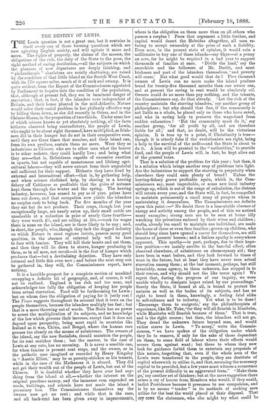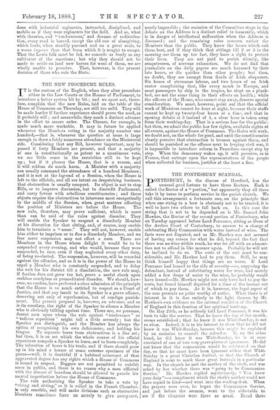THE DESTINY OF LEWIS.
THE Lewis question is not a great one, but it contains in itself every one of those burning questions which are now agitating English society, and will agitate it more and more. The rights of property, the claims of the masses, the obligations of the rich, the duty of the State to the poor, the right method of curing destitution,—all the subjects on which the pioneers of new departures are deeply thinking, and " philanthropic " charlatans are noisily chattering, are raised by the condition of that little island on the Scotch West Coast, with its 770 square miles, much of it of rock and swamp. It is quite evident, from the Report of the Commissioners appointed by Parliament to inquire into the condition of the population, that, although at present fed, they are in imminent danger of starvation ; that, in fact, if the islanders were independent of Britain, and their home planted in the mid-Atlantic, Nature would solve their social problem in her pitilessly effective way by killing them down, as she did recently in Orissa, and in the Chinese Shans, in the proportion of two-thirds. Under some law of which science knows as yet absolutely nothing, all the facts hitherto observed being contradictory, the people of Lewis, -who ought to be about eight thousand, have multiplied, as Irish- men did in their hunger but do not in their comparative ease, until they are three times that number, and their island can, from its own produce, sustain them no more. Were they as industrious as Chinese, who are to other men what the beaver is to other rodents, they could hardly live ; and being what they are—,-that is, Hebrideans capable of excessive exertion in spurts, but not capable of monotonous and lifelong agri- cultural labour—they will never extract from their ungrateful soil sufficient for their support. Hitherto they have lived by external and intermittent effort—that is, by gathering kelp, and when science abolished kelp, by sharing in a herring fishery off Caithness so profitable that the gains of autumn kept them through the winter and the spring. The herring industry, however, has ceased to pay as of yore, prices have been out down, and that occupation now yields the islanders no surplus cash to bring back. For five months of the year they eat but do not produce. Their crops, though last year exceptionally large, are nearly eaten up, their small cattle are unsaleable at a reduction in price of nearly three-fourths- they were worth £5, and are selling at 30s.—work for wages there is none on the island, nor is there likely to be any ; and, in short, the people, who, though they lack the dogged industry on which Nature in most regions insists, possess many good qualities, in the absence of external help will be face to face with famine. They will kill their beasts and eat them, and then they will lie down to starve, hunger producing in them, as in all men, not revolt—it is the fear of hunger which produces that—but a devitalising dejection. They have only oatmeal and little fish even now ; and before the next crop can be gathered in, they will, the Commissioners report, have nothing. It is a horrible prospect for a complete section of mankind occupying a definite bit of geography, and, of course, it will not be realised. England is too rich and too near, and acknowledges too fully the obligation of keeping her people from actual starvation. Food will be forthcoming for Lewis ; but on whom does the obligation of paying for it justly rest ? The Times suggests throughout its account that it rests on the people themselves, because the islanders multiply too fast ; but that is a mere throwing out of words. The State has no power to arrest the multiplication of its subjects, and no knowledge of the law which governs their increase, except that it does not depend upon prosperity, being most rapid in countries like Ireland as it was, China, and Bengal, where the human race presses too closely on the means of subsistence. The owners of the island, say the new Socialists, should maintain the people, for its rent enriches them ; but the answer, in the case of Lewis at any rate, has no meaning. It is never a sensible one, for when famine is present rent stops, and the owner, as in the pathetic case imagined or recorded by Henry Kingsley in " Austin Elliot," may be as poverty-stricken as his tenants, while in the case of the Mathesons it is absurd. They did not get their wealth out of the people of Lewis, but out of the Chinese. It is doubtful whether they have ever had any- thing from the island at all,—whether the interest on the original purchase-money, and the immense sum expended on roads, buildings, and schools have not made the island a pecuniary loss. The Commissioners themselves say the owners now get no rent ; and while that is the case, and all back-rent has been given away in improvements, where is the obligation on them more than on all others who possess a surplus ? Press that argument a little further, and capital would desert the Hebrides altogether, all men re- fusing to accept ownership at the price of such a liability. Even now, in the present state of opinion, it would ruin a millionaire to buy one of these islands—say Skye—at a penny an acre, for he might be required in a bad year to support thousands of families at once. ' Divide the land,' say the anarchists and the followers of Mr. Devitt, and most Irishmen and part of the islanders themselves, and poverty will cease.' But what good would that do ? Five thousand owners of Lewis can no more make the island produce bread for twenty-five thousand mouths than one owner can, and at present the saving in rent would be absolutely nil. Owners could do no more than pay nothing, and the tenants, the Commissioners say, do that already. 'Let the rich of the country maintain the starving islanders,' say another group of philosophers ; but why should that fine, if the community is not liable as a whole, be placed only on those who have saved, and who in saving help to preserve the wage-fund from sudden exhaustion ? 'But the community must do it,' say another group, for all profit by all, and are therefore liable for all ;' and that, no doubt, will be the victorious opinion. It is true up to a point, if Christianity is true— though it is utterly false if the evolutionists are right, being a help to the survival of the unfit—and the State is about to do it. A loan will be granted to the "authorities," to provide food, and the people of Lewis will, in fact, be kept alive out of the general taxes.
That is a solution of the problem for this year ; but then, it is a solution which brings another crop of problems into light. Are the industrious to support the starving in perpetuity when elsewhere they could earn plenty of bread ? Unless the herring-fishery grows profitable again, which is, the Com- missioners say, most improbable, or some new local industry springs up, which is out of the range of calculation, the distress will return every year, and the State will, in fact, be compelled to maintain permanently a small army of paupers whom in maintaining it demoralises. The Commissioners are definite upon this point :—" No doubt there is a lamentable absence of energy and activity among the people, and of this we noticed many examples ; strong men are to be seen at home idly watching the privations endured by their wives and children ; crofts, already too small to maintain one individual, are made the home of three or even four families ; grown-up children, who should long since have opened a career for themselves, are still inmates of parents' houses ; and a listless apathy is everywhere apparent. This apathy—in part, perhaps, due to their hope- less position—we mainly ascribe to the baneful effect, often observed elsewhere, of subsistence on eleemosynary aid ; they have been in want before, and they look forward to times of want in the future, but at least they have never seen actual starvation among them ; at the last moment, perhaps, but still invariably, some agency, to them unknown, has stepped in to their rescue, and why should not the like occur again ? We regret that, during the progress of our inquiry, we were unable wholly to dissipate hopes raised by our proceedings." Surely the State, if bound at all, is bound to protect the natures as well as the bodies of its subjects, and has no right to breed in them, knowingly, a feeling fatal alike to self-reliance and to industry. Yet what is to be done ? Encourage them to emigrate,' say the philanthropists of experience, like Mr. Tuke, 'for they will all flourish in Manitoba, while Manitoba will flourish because of them.' That is true, and is the right course ; but then, the islanders will not go. They dread the unknown future beyond seas, and would rather starve in Lewis. " To many," write the Commis- sioners, " we have spoken of the obligation under which they lie to remove, if only for the sake of those dependent on them, to some field of labour where their efforts would secure them against want ; but those to whom they now look for guidance forbid them to entertain any proposals of this nature, forgetting that, even if the whole area of the Lewis were transferred to the people, they are destitute of capital wherewith to utilise it, and that, assuming the necessary capital to be provided, but a few years must witness a recurrence of the present difficulty in an aggravated form." Make them go,' say another set of thinkers; but at the mere suggestion there arises a cry of horror from Members who would, if they could, indict Providence because it presumes to use compulsion, and is by no means " tender " in its methods of making men utilise for the beat the world placed at their disposal. That cry cows the statesmen, who else might try what could be
done with industrial regiments, instructed, disciplined, and mobile as if they were regiments for the field. And so, what with theories, and " tendernesses," and dreams of redistribu- tion, every road is barred, except the old one of almsgiving. which leads, when steadily pursued and -on a great scale, to a worse impasse than that from which it is sought to escape. That the Lewis folk must be fed, we concede as freely as any cultivator of the emotions ; but why they should not be made to settle on land now barren for want of them, we are wholly unable to perceive. That, however, is the present decision of those who rule the State.



































 Previous page
Previous page